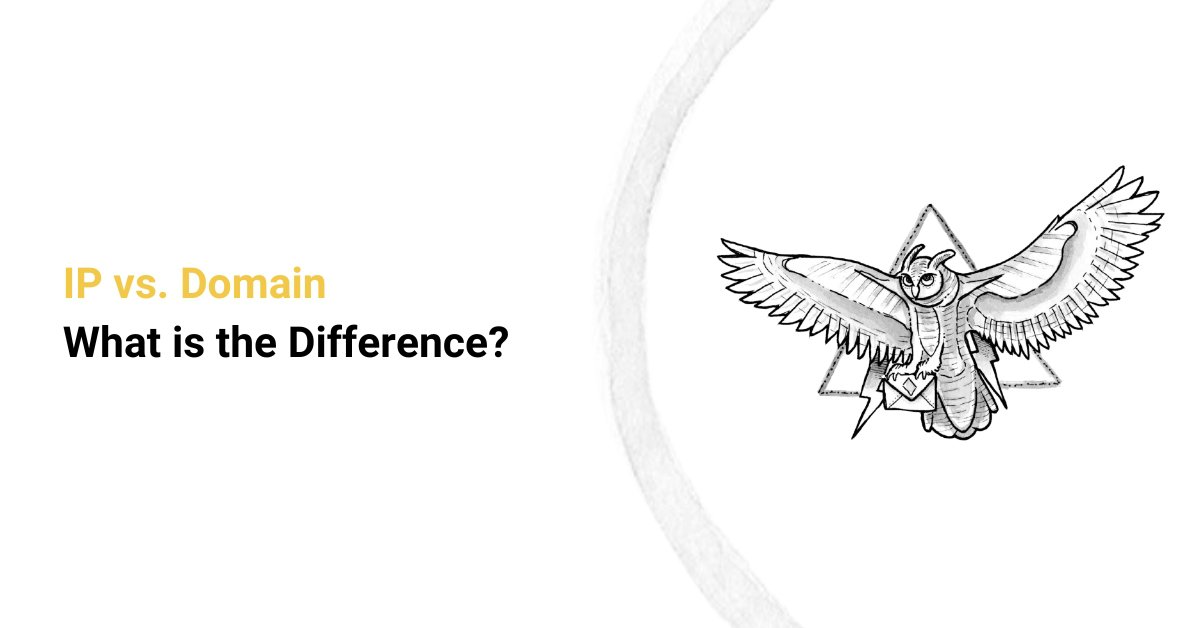People unfamiliar with website hosting are often confused by the difference between an IP address and a domain name. While both are essential for internet communication, they serve two entirely unique purposes. IP stands for Internet Protocol, which is a machine-readable identifier, while a domain is a human-friendly label that simplifies navigation. Together, they form the backbone of how websites, emails, and other online services function.
In this blog, we break down the differences between Internet Protocol addresses and domain names, explore how they operate together, and highlight their importance in web hosting, email deliverability, and beyond. If you're looking to optimize your IP address and domain name for increased brand visibility, our email deliverability solutions are here to help.
Summarizing the Key Points:
- An IP address is a unique numerical identifier that allows devices to communicate over the internet.
- A domain name is a user-friendly address that replaces complex numerical IPs to make the internet easier to use.
- The Domain Name System (DNS) serves as a translator, converting domain names into IP addresses.
- Understanding the difference between IP addresses and domains helps with website hosting, email deliverability, and digital communication.
What is an IP Address?
Every device connected to the internet or a local network receives a unique numerical label called an IP address. It serves two distinct purposes. Firstly, identifying a device and secondly, enabling communication between devices. For example, an IPv4 address might look like 192.168.1.1, while an IPv6 address (a newer standard with more address space) might appear as 2001:0db8:85a3:0000:0000:8a2e:0370:7334.
Think of an IP address as the digital equivalent of a postal address. Just as a postal address allows physical mail to reach your house, an IP address ensures that data from the internet reaches the correct device or server. When you visit a website, your browser sends a request to the web server hosting that site using its IP address. The web server then responds by sending the requested webpage to your device. This process happens in milliseconds, making it seem effortless to users.
For example, let’s say you want to visit Google. When you type google.com into your browser, your device doesn’t immediately know where Google’s server is located. Instead, it uses a process to resolve the domain name into its corresponding IP address, which is 172.217.164.110. This numerical label ensures that your request reaches Google’s servers, which then load the website on your screen.
Main Types of IP Addresses
Here are the main types of IP addresses:
- Static IP Addresses: These are fixed addresses that do not change until manually altered. Static IP addresses are often used for servers hosting websites or critical online services.
- Dynamic IP Addresses: These are temporarily assigned to a device by an ISP. Dynamic IP addresses can change periodically, often when the device reconnects to the network or after a set period.
- Public IP Addresses: These are globally unique identifiers assigned to devices that connect directly to the internet. Public IP addresses are visible to all and enable communication over the internet.
- Private IP Addresses: These are used within a local area network (LAN) to identify devices like computers, smartphones, printers, or smart devices. Private IP addresses are not accessible directly from the internet and are used to communicate within a private network.
- Shared IP Addresses: These are used by multiple websites or users on the same server. In a shared hosting environment, a single IP is assigned to a server hosting several websites, all of which share the same IP address.
- Dedicated IP Addresses: These are public IP addresses that are exclusively assigned to a single device or service. Unlike shared IPs, a dedicated IP belongs to only one user or entity.
What is a Domain?
A domain name, on the other hand, is a human-readable address that allows users to access websites or services without needing to remember complex IP addresses. Instead of typing 172.217.164.110 into your browser to access Google, you can simply type google.com. Domains make the internet more accessible. Without domains, we would have to memorize different IP addresses for every website we wanted to visit, which would be a daunting and impractical task.
While a domain name’s primary role is to make the internet user-friendly, they are also popularly used for branding purposes. For businesses and organizations, a memorable domain name, such as yourbusiness.com, is vital for online visibility and credibility.
Every domain is unique and registered through domain registrars like GoDaddy, Namecheap, or Google Domains. After you register a domain, DNS records link it to an IP address, so when users type the domain into their browser, they reach the correct server.
The Relationship Between IP Address and Domain
While IP addresses and domains serve distinct roles, they are interconnected —and this connection is essential for accessing websites and online services.. Here are two popular examples highlighting the relationship between IP addresses and domain names.
How Domain Name System Connects IP and Domain
The Domain Name System (DNS) acts as a translator between domains and IP addresses. It runs DNS queries when you enter a domain name, such as www.example.com, allowing your browser to contact the correct IP address (using the DNS resolution process). Without the DNS root, you would need to remember and manually enter the IP address of every website you want to visit.
Hosting Websites and Routine Emails
Domains and IP addresses are essential for hosting websites and routing emails to the correct email servers. Both of these functions rely on DNS records, which act as instructions for directing traffic to their destinations. There are two versions of DNS records: A Records and MX Records. The first one links domains to IP addresses, enabling website hosting, while the second directs emails to the appropriate mail servers.
Key Differences Between IP and Domain
Although IPs and domains work together, they serve unique purposes. Here are the primary differences between IP and domain.
- Purpose and Function: IP addresses are technical identifiers used by devices to locate and communicate with each other, while a domain name is a user-friendly alias designed to make online navigation easier for humans
- Accessibility and Management: IP addresses are assigned by ISPs or hosting providers. Dynamic IPs may change over time, while static IPs remain constant. Domain names, on the other hand, are purchased and managed through registrars. Domains need to be renewed periodically to retain ownership.
- Memorability: IP addresses are difficult to recall due to their numerical format. However, domain names are easy to remember and play a critical role in branding and marketing.
Why is It Essential to Understand the Differences Between IP and Domain?
Understanding the difference between IP addresses and domain names is crucial for correctly setting up your brand's online presence. Here are three scenarios where this information is crucial for business owners.
Website Hosting
Knowing how domains and IP addresses interact with each other allows you to properly configure web server settings. Misconfigured DNS settings can lead to issues like website downtime or slow loading speeds. To prevent this, you must use reputable DNS management tools to regularly check and update your domain’s A records and other configurations.
Email Deliverability
Domains and IPs play a key role in email marketing. Misaligned DNS settings or a poor IP reputation can result in your emails being blocked by ISPs. Therefore, you need to authenticate your emails using SPF, DKIM, and DMARC protocols to improve email deliverability and protect your domain’s reputation.
Scalability and Security
Understanding the relationship between domains and IPs allows you to make informed decisions when choosing hosting solutions and security partners. For example, eCommerce websites often use dedicated IP addresses instead of shared IPs, as they provide SSL certificates and direct access to a web server without relying on a domain name.
Common Misconceptions Around IP Addresses and Domains
Many people misunderstand how IPs and domains work. Let’s address some common misconceptions.
- Domain and IP are the same: While domain names and IPs work together, they serve entirely different roles. For example, domains simplify navigation, while IPs handle the technical side of communication.
- I can only have one domain per IP: This is not true, as shared hosting allows multiple domains to have a single IP address. This is a cost-effective solution for small websites.
- I don't need a domain for my website: Technically, you could use an IP address instead of a domain. However, this approach is impractical and unprofessional since a domain name is easier to remember.
Best Practices for Managing IP and Domain
Here are three tried and tested best practices to help you better manage your IP address and domain name:
Monitor DNS Settings
Ensure that your DNS records, such as A records, CNAME records, and MX records, are accurate and up to date.
Implement Email Authentication Protocols
Use SPF, DKIM, and DMARC protocols to authenticate email communications. By setting up proper authentication protocols, you minimize spoofing and phishing attacks.
Choose the Right Web Hosting Service
Evaluate your hosting requirements to select the best option. Shared hosting is ideal for low-traffic websites, while VPS hosting offers better control for moderate traffic. Finally, dedicated hosting is ideal for high-traffic or resource-intensive websites.
Improve Your IP and Domain Reputation Today
Understanding the difference between IP addresses and domains is essential for effective online communication. While IPs handle technical routing, domains provide a user-friendly interface for internet navigation.
By mastering these concepts, you can optimize website hosting, improve email deliverability, and enhance your digital presence. Book a discovery call today to learn how you can optimize your next marketing campaigns with Email Industries' guidance.








